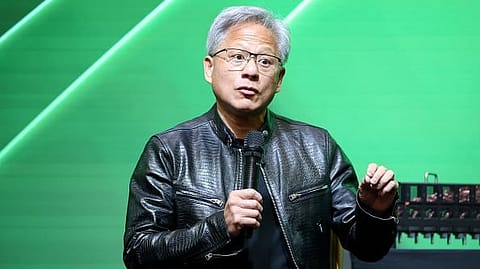Nvidia becomes the first company to cross $5 trillion in market cap amid unabated demand for its chips
Nvidia CEO Jensen Huang said in Washington that it will build seven supercomputers for the U.S. government and has $500 billion in chip bookings.

Nvidia, once known for its niche graphic cards primarily used in the gaming industry, has been at the forefront of the AI boom witnessed in the last few years. Nvidia’s unparalleled role in the AI boom once again came to the fore on Wednesday, when its market capitalisation crossed $5 trillion, making it the first company to do so.
The company had crossed the $4 trillion milestone barely three months ago. The recent rally in the Nvidia share price came after Nvidia CEO Jensen Huang—who has led the company since it was established in 1993—said on Tuesday at Nvidia’s Developers’ Conference in Washington that it will build seven supercomputers for the U.S. Department of Energy and has $500 billion in bookings for its advanced chips. The U.S will use the supercomputers developed by Nvidia to maintain and develop nuclear weapons, along with research on alternative energy.
Nvidia’s advanced Blackwell chip has also been a bone of contention in the ongoing trade tensions between the U.S. and China, insofar as the Trump administration has restricted the export of Nvidia-made chips to China. As of FY25, Nvidia’s sales from China are at 13.1%, compared to 21.4% in FY23. According to media reports, U.S. President Donald Trump is expected to discuss the Blackwell chips with his Chinese counterpart, Xi Jinping, on Thursday. Nvidia’s Blackwell and H100 chips power large-language models, including ChatGPT and Elon Musk’s xAI.
Recently, Apple crossed the $4 trillion market capitalisation milestone, making it only the third company after Nvidia and Microsoft—which crossed the milestone in July—to do so. Apple shares have risen around 6% over the past month, driven by increased sales of the iPhone 17 series, launched in September. The stock price has advanced by 27.36% over six months.
Nvidia has also announced a partnership with Nokia. As part of the investment, Nvidia will be investing $1 billion for a 2.9% stake in the Finnish telecom company, making it the second-largest shareholder in Nokia. The partnership aims to accelerate the development and deployment of next-generation AI-native mobile networks and AI networking infrastructure, as per the statement.